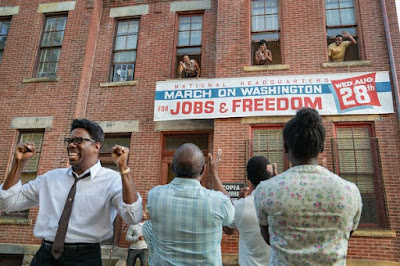Everyone know its was a seminal moment for the American Civil Rights Movement.
A quarter of a million people were brought onto the streets of the US nation's capital for a peaceful demonstration and a massive show of strength.
But who co-ordinated it?
George C Wolfe's Netflix biopic 'Rustin' sets out to answer that question.
Executive produced by Barack and Michelle Obama, it celebrates the contribution of Bayard Rustin to the civil rights struggle and his central role in organising the march.
But it also shines a light on the obstacles he had to overcome as a gay man at the centre of civil rights activism.
Colman Domingo plays Rustin, a Quaker, a former Communist and a one time close friend of Dr Martin Luther and Corretta Scott King whose sexuality was used against him to force him out of the Civil Rights movement prior to a planned protest at the 1960 Democratic National Convention.
Watching efforts to suppress the civil rights movement in Birmingham, Alabama and elsewhere, Bayard is compelled to get involved again after three years in exile.
However he has severed contact with the Kings after his departure from the movement.
Brainstorming with fellow activists Gus Harper's Tom, Lilli Kay's Rachelle, Melissa Rakiro's Yvette and Jordan Amanda-Hall's Charlene, he runs with the idea of a two day peaceful demonstration in Washington with 100,000 protesters bussed into the city.
The plans include surrounding the White House and camping in the grounds of the Lincoln Memorial to send a message to the Kennedy administration and Congress of the need to address civil rights demands.
Teaming up with Glynn Turman's legendary civil rights and labour leader A Philip Randolph, he sets about trying to bring ten civil rights organisations together.
However he initially encounters scepticism, with Chris Rock's NAACP chief Roy Wilkins particularly resistant to the idea.
On Randolph's suggestion, Bayard goes to Alabama to reconnect with Aml Ameen's the Rev Dr Martin Luther King and his wife, Carra Paterson's Coretta.
Winning Dr King over to the idea of a massive, peaceful demonstration of support for the civil rights cause in Washington DC, he secures wider support for the march.
But as he sets about delivering the huge demonstration, recruiting CCH Pounder's educator and civil rights campaigner Dr Anna Hedgeman, Bayard's sexuality also becomes an issue.
Romantically involved with Tom, he also becomes entangled with Johnny Ramey's preacher Elias Taylor whose wife, Adrienn Warren's Claudia is a huge admirer of Bayard's activism.
Elias, however, is conflicted about his sexuality, while Tom grows jealous about all the attention Bayard lavishes on the preacher.
Revelations about Bayard's past involvement with the Communist Party and his arrest in Pasadena in 1953 for lewd conduct with two men in a car are used by political opponents to discredit his work.
This brings Bayard into direct conflict with Jeffrey Wright's Baptist pastor and New York Congressman Adam Clayton Powell Jr who was responsible for driving him out of the movement in 1960 by threatening to leak to the media false stories about an affair between Rustin and Dr King.
At a stormy meeting, Adam Clayton Powell Jr argues Bayard is an unfit person to lead efforts to organise the march and his sexuality and past political associations will be used to discredit the march.
With the FBI also monitoring his every move, how does Bayard pull off one of the most impressive peaceful political demonstrations the world has ever witnessed?
Working from an earnest script by Julian Breece and Dustin Lance Black, Wolfe delivers a sturdy, if a bit too conventional historical movie about a much overlooked figure in the US civil rights movement.
His film begins at a frenetic pace, powered by a lively Branford Marsallis' jazz score and some vibrant Spike Lee stylings by cinematographer, Tobias A Schliessler, darting between colour and black and white images.
However it soon settles down into the standard pace of a civil rights movie like 'Selma'.
You can't help wishing though that Wolfe, who gave us the Oscar nominated 'Ma Rainey's Black Bottom' three years ago, would impose himself more on the film.
The film feels like a dutiful historical drama but is almost too faithful to the beats of the genre.
What it does have going for it is a committed central performance by Colman Domingo who really steps up in the lead role.
An accomplished character who stood out in 'Ma Rainey's Black Bottom' and Barry Jenkins' 'If Beale Street Could Talk,' it's good to see him getting an anchor role and he is well up to the task, delivering a charismatic performance that dominates the film.
Ramey, Turman, Ameen, Halper, Pounder, Kay, Warren, Paterson and Maxwell Whittingham Cooper as John Lewis are good value as mainstays of the Civil Rights Movement.
Chris Rock, however, doesn't totally convince as Roy Wilkins.
Jeffrey Wright, on the other hand, serves up the film's other striking performance, oozing arrogance and mean spiritedness.
'Rustin' is a handsomely made film that has interesting things to say about the treatment of women in the Civil Rights Movement and its awkwardness around homosexuality.
While Wolfe's movie never quite scales the heights it should, it is nonetheless a decent watch that highlights the contribution of a significant figure in the battle for civil rights who ought to be celebrated more.
For that reason alone, it deserves a watch.
('Rustin' received its world premiere at the Telluride Film Festival on August 31, 2023 and was made available for streaming on Netflix on November 17, 2023 after a brief cinema release)






.jpeg)


Comments
Post a Comment